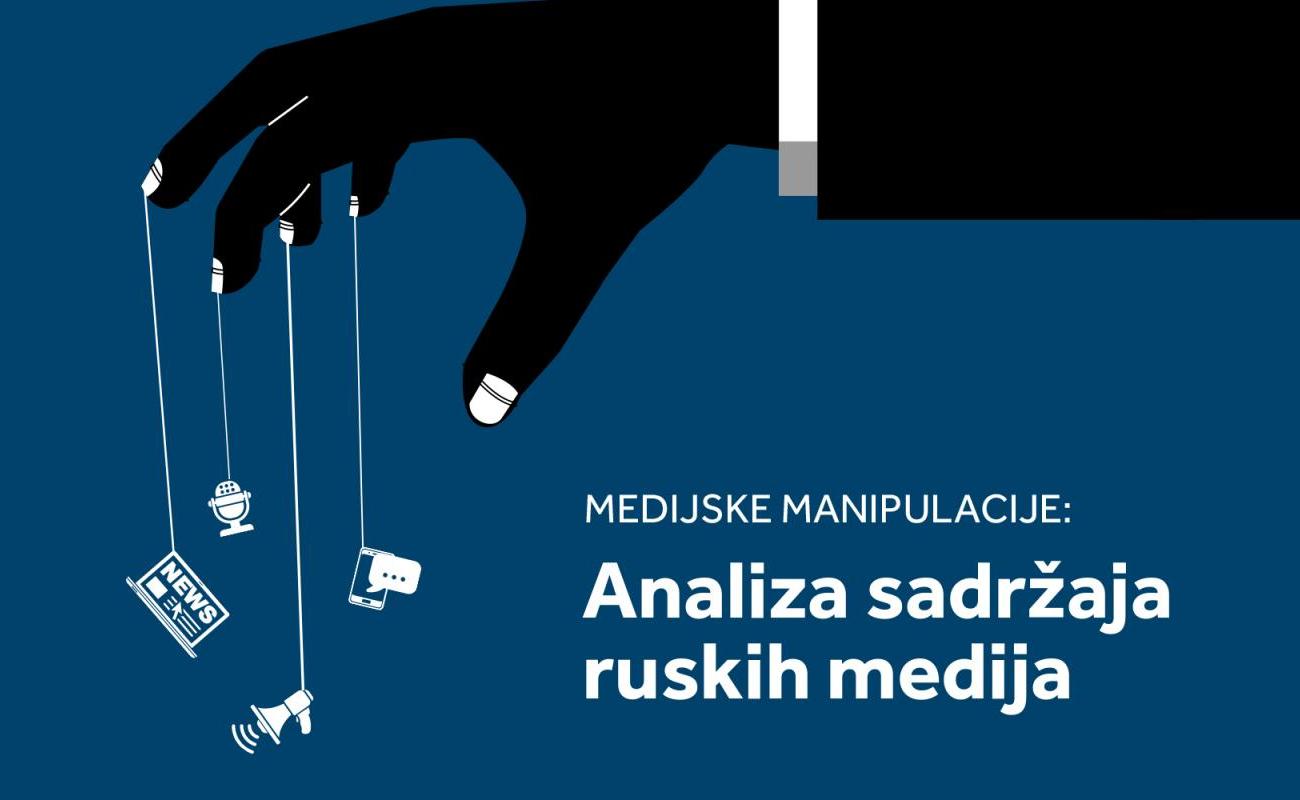Media manipulations: Content analysis of Russian media

In the period from May 1 to July 31, the Digital Forensic Center analyzed the content related to Montenegro on the Russian propaganda platforms RT Balkan and Sputnik Serbia. Those media, as branches of the Russian state media in Serbia, are under sanctions of the European Union due to the aggression against Ukraine, which was joined by Montenegro. The goal of the monitoring was to show how and to what extent branches of the Russian state propaganda media based in Belgrade report on Montenegro.
In its earlier analyzes and studies, the DFC pointed to the role of these media as a channel for the spread of Russian and Serbian malignant influence in Montenegro. The main characteristic of reporting on Montenegro is the promotion of anti-Montenegrin and pro-Serb narratives. This was also shown by the three-month monitoring of the DFC, which included the following topics: the Montenegrin Government's vote for the Resolution on the Srebrenica genocide, the vote on the Resolution on Jasenovac, the extradition of businessman Duško Knežević, the announcement of the assassination of the former President of Montenegro Milo Đukanović and the ban on broadcasting of Russian media in Montenegro.
During the monitoring period, a total of 203 articles were analyzed on the RT Balkan portal. Half of the analyzed articles contained some form of information manipulation in an attempt to influence public opinion. On the RT Balkan portal, the key narratives were: Foreigners/the West rule Montenegro (46), Montenegro throughout history has had no one closer than Serbia and Russia (31), Montenegro is divided (24), Discrimination and endangerment of Serbs in Montenegro (22) and the Resolution on the genocide in Srebrenica declares the Serbs to be a genocidal nation (20).
The Montenegrin authorities' decision to cancel the broadcasting of Russian media on the RT Balkan portal is characterized as fascism, and Montenegro as a province of the NATO pact that does everything that is asked of it and that Montenegro has agreed not to think for itself. Therefore, that decision relaunched the narrative that we have also already analyzed, which is the denial of Montenegro's sovereignty in conducting foreign policy in accordance with its own foreign policy interests.
During May, June and July, 137 articles were analyzed on the Sputnik Serbia portal, of which 72 contained one or more narratives. Almost the same narratives are recognized on that portal as on RT Balkan, which indicates a synergy in their action. The narrative with the largest number of texts was that the Resolution on Srebrenica declares the Serbs a genocidal nation (31), followed by the narratives: Foreigners/the West rule Montenegro (26), Montenegro throughout history has had no one closer than Serbia and Russia (17) , Demonization of the West (10) and Montenegro is divided (9).
Sputnik Serbia led a strong campaign that tried to present the Resolution on Srebrenica as an act that represents the Serbian people as genocidal and that Montenegro is under pressure from Western powers to vote for the Resolution on the genocide in Srebrenica. In the statements of the interlocutors of Sputnik Serbia, a narrative that is increasingly present in the public space can be seen, namely that Montenegro is an ambassadorial state and that its internal and external policy is managed by Western embassies and Western power centers. The narrative that has been filling the columns of Serbian media for years about the threat and disempowerment of Serbs in Montenegro is present and has been.
In July 2024, the official Podgorica banned the broadcasting of the content of 20 Russian media, including the Balkan services of RT and Sputnik, and thus agreed with the foreign policy of the European Union in monitoring measures against Russia, due to the invasion of Ukraine. Nevertheless, it is still possible to access the Sputnik Serbia and RT Balkan portals, because there is no institution in Montenegro that is responsible for the portals and their operation. Hybrid campaigns produced by RT Balkan and Sputnik Serbia, which directly oppose the Euro-Atlantic commitment of Montenegro, are also spread through the propaganda portals IN4S and Borba. Credible transmission of texts from Russian branches in Belgrade on pro-Serbian and pro-Russian portals in Montenegro is especially noticeable during important socio-political processes in Montenegro.
The lack of response from Montenegrin institutions to coordinated campaigns carried out by portals in synergy with political actors, organizations and analysts further undermines public trust in the work of state institutions. Such passivity of institutions contributes to the spread of misinformation, negative narratives and sensationalist content, which seriously threatens democratic processes and the stability of society. Instead of actively reacting and sanctioning such phenomena, institutions leave room for manipulation of public opinion, which increases tensions and polarization of Montenegrin society.
